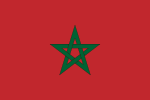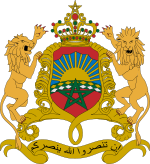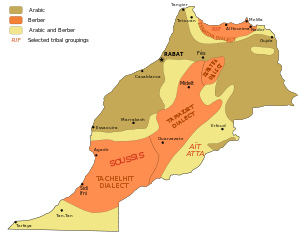- Moroccan people
-
This article is about the people of Morocco. For a specific analysis of the population of Morocco, see Demographics of Morocco.
Moroccans
المغاربة




Total population 39-40 million (worldwide) Regions with significant populations  Morocco 31,993,000 (2009)[1]
Morocco 31,993,000 (2009)[1] France
France1,200,176  Israel
Israel1,000,000 [2]  Spain
Spain800,000 [3]  Italy
Italy355,000 [4]  Netherlands
Netherlands680,000 [5]  Belgium
Belgium333,244 [6]  Germany
Germany202,000 [7]  United States
United States38,923 (2000) [8] Languages Moroccan Arabic
Berber (Riff, Shilha, Central Atlas Tamazight)Religion The Moroccan people (Arabic: المغاربة Modern Standard Arabic: al-Maghāribah, Moroccan Arabic: l-Mgharbah) are a people that share a common Moroccan culture, ancestry and speak the Moroccan variant of the Arabic language or a Berber language as a mother tongue.
In addition to the nearly 32 million Moroccans in Morocco, there is a large population in France, Belgium, Italy, the Netherlands, Spain and smaller groups in United Kingdom, United States and Canada ( see Moroccan diaspora ).
Because of wide-ranging diaspora, about estimated 4.5 million Moroccans living abroad and of full or partial Moroccan ancestry live outside of Morocco, most notably in Europe, North America and many Arabic-speaking countries like Saudi Arabia, the United Arab Emirates and Kuwait amongst others.
Contents
Ethnic groups and ancestry
Morocco's population is a mix of Berbers and Arabs. Though the majority of the population is of Berber origin many Moroccans today identify as Arabs. Culturally and genetically the Moroccan population is very homogenous, the distinction between Arabs and Berbers is unaccounted for in the society; it can, however, be made along linguistic lines. Assuming that it is possible to separate Arabs from Berbers in Morocco, Arabic speakers are believed to be about 66% of the Moroccan population, although this includes people of Berber or mixed descent.
Classical Arabic is one of the official languages of Morocco, alongside Berber and is used in limited socio-economic and cultural activities and written newspapers. In July 2011, "Amazigh", a standardized version of all the Berber languages of Morocco, became an official language alongside Arabic.
There has been many influxes of populations in Morocco; first the Phoenicians and Romans in pre-Islamic periods, then the Arab immigrations in the 8th and 11th-century and finally the Slave trade from Europe and sub-Saharan Africa that occurred throughout the middle-ages up to the 19th-century.
Morocco had in the past a significant Jewish population, but the majority immigrated to Israel, Europe and North America since the country's independence. There are only about 5,000 Jews who still live in the country.
Berber groups
- Riffian people
- Zayanes
- Chleuh
Culture
Through Moroccan history, the country had many cultural influences (Europe, middle-east and sub-Saharan Africa). The culture of Morocco shares similar traits with that of neighboring countries, particularly Algeria and Tunisia and to a certain extent Spain.
Each region possesses its own uniqueness, contributing to the national culture. Morocco has set among its top priorities the protection of its diversity and the preservation of its cultural heritage.
Languages
Morocco's official languages are Classical Arabic and since July 2011, "Amazigh language" which is a standardized version of the Berber languages.
The majority of the population natively speaks Moroccan-Arabic. More than 12 million Moroccans speak Berber — which exists in Morocco in three different dialects (Riff, Shilha, and Central Atlas Tamazight) — either as a first language or bilingually with Moroccan Arabic.
The Hassaniya Arabic is spoken in the southern part of country. Morocco has recently included the protection of Hassaniya in the constitution as part of the July 2011 reforms.
French is taught universally and still serves as Morocco's primary language of commerce and economics; it is also widely used in education and government.
Spanish is also spoken by some in the northern part of the country as a foreign language. Meanwhile English, is increasingly becoming more popular among the educated particularly in the science fields although its usage remains very limited.
See also
References
- ^ Department of Economic and Social Affairs Population Division (2009) (PDF). World Population Prospects, Table A.1. 2008 revision. United Nations. http://www.un.org/esa/population/publications/wpp2008/wpp2008_text_tables.pdf. Retrieved 2009-03-12.
- ^ History of the Jews in Morocco
- ^ INE 2010
- ^ Moroccan people in Italy
- ^ CBS 2010
- ^ Bijlage bij BuG 22
- ^ Marokkanische Diaspora, Ministerie voor ontwikkelingssamenwerking Duitsland, 2007, page 3
- ^ Moroccan American
 Morocco topics
Morocco topicsHistory AncientEarly IslamicIdrissid dynasty · Barghawata Confederacy · Kingdom of Nekor · Umayyad Caliphate · Caliphate of CordobaMoroccan dynastiesIdrisids · Barghawata Confederacy · Almoravids · Almohads · Marinids · Wattasids · Saadis · AlaouitesEuropean influence
(1912-1956)Modern

Politics
EconomyGeography Culture Military Demographics Moroccans · Moroccan diaspora · Cities · Languages · Moroccan Arabic · Berber languages · Western SaharaMoroccan diaspora By country  Categories:
Categories:- Moroccan diaspora
- Moroccan society
- Ethnic groups in Morocco
Wikimedia Foundation. 2010.

